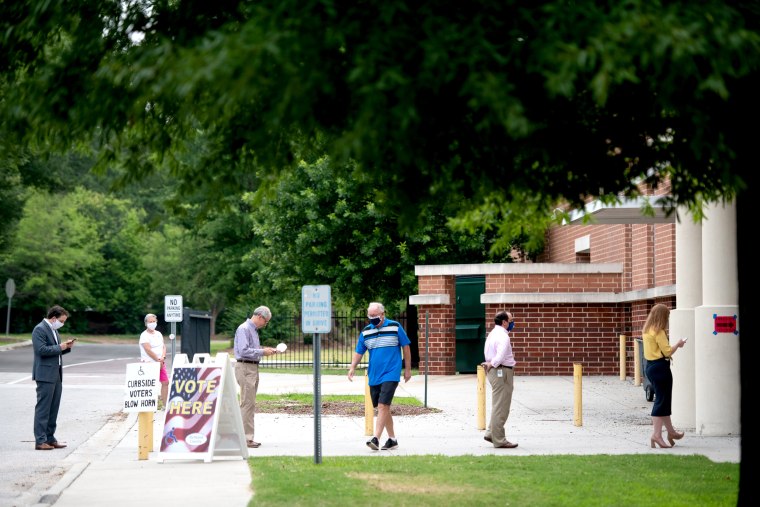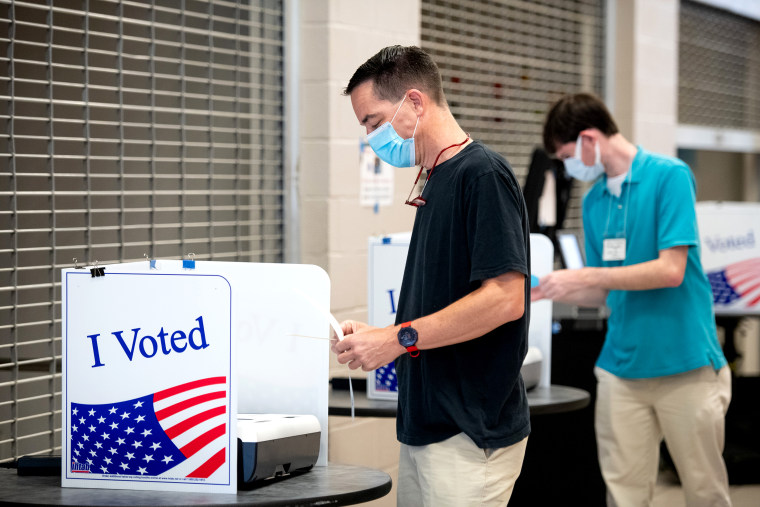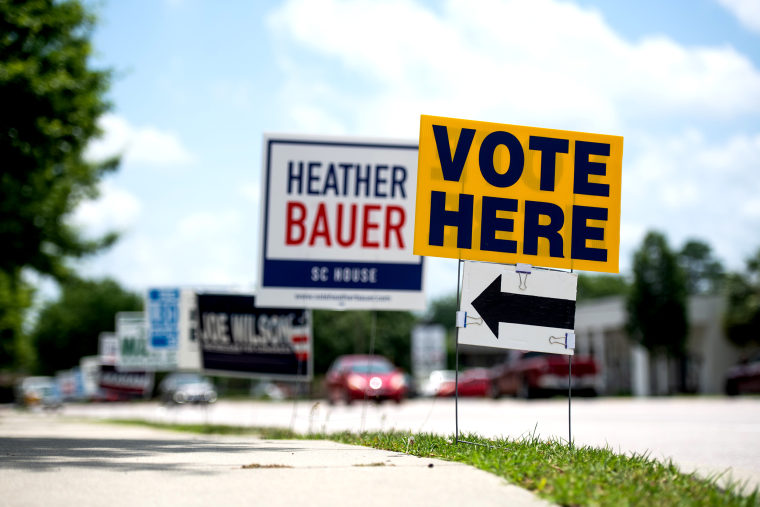This story was originally published by The Center for Public Integrity, a nonprofit, nonpartisan investigative news organization in Washington, D.C.
The night before South Carolina's June 9 primary, Melinda Anderson of Columbia got a robocall from a local county council candidate that said her polling place had been moved to a new location — something she hadn't realized.
When her son got home from work the next day, he drove Anderson, 71, to the curbside line for disabled voters at about 4:45 p.m. and waited. And waited. After more than three hours of inching along, alternating between running the air conditioner to ward off the 90-degree June heat and turning off the car to give it a break, they still weren't close to the front of the line. Hungry, they left at 8:15 p.m.
"I'm still upset that I didn't get to vote," Anderson said. "Whether my vote mattered or not, I wanted my vote to be counted. That's what I'm worried about in November."
Anderson's precinct, Briarwood, has around 2,500 voters. Nearly two out of three are, like Anderson, Black. The move from the usual polling place to Spring Valley High School, prompted by poll worker shortages attributable to the pandemic, meant that voters in this precinct, on average, had to travel nearly 3 miles more to vote in person. That's the second-largest distance increase for any Richland County precinct, according to an analysis by the Center for Public Integrity.
Click here to read the Center for Public Integrity's version of this story.
Spring Valley typically hosts one precinct and serves a little more than 2,000 voters. For the primary, though, election officials assigned four additional precincts to vote there, all four of which had a majority of Black voters. The upshot: Spring Valley High School was assigned to handle more than five times the number of voters who use it in a typical election. Ultimately, it had more voters assigned to it than any other Richland County polling location, Public Integrity's analysis found.
"That consolidation of five precincts into one should never have happened," said Keith Amos, 48, another Briarwood voter who said he spent five hours waiting to vote and said he only learned about the change in polling place the morning of the election. He called the lines "unethical."

During this coronavirus-plagued primary season, some of the sharpest reductions in numbers of polling places — and longest lines — have come in cities that, like Columbia, are home to many voters of color, prompting warnings about potential disenfranchisement, even as states move to increase the availability of mail ballots. A new report released last week by the nonprofit Voter Protection Corps found Black Americans, Native Americans, voters who need language assistance, and people with disabilities all vote in person at higher rates than average, so maintaining in-person voting options in November is essential. That report found a connection between last-minute polling location changes in some primaries and lower turnout.
Election experts say it's clear many voters will need safe in-person options in November. But election officials are struggling to find polling sites willing and suitable to host voters during the pandemic, as well as enough poll workers to staff them. Terry Graham, Richland County's interim director of voter registration and elections, said the county began consolidating polling places about a month before the primary election because the owners of some facilities the county usually uses weren't responding to them, and poll workers were dropping out. County officials were still making changes the week before the election, he said.
Polling place relocations and consolidations don't affect all voters the same way. In Richland County, six of the 10 precincts that saw the largest average increases in distance had a majority of African American voters, including three of the four precincts reassigned to Spring Valley High School, according to a Public Integrity analysis of in-person polling place locations obtained from the state and voter file data provided by L2, a national nonpartisan data provider.
Across the state and Richland County, Public Integrity's analysis found that on average, distances changed more or less evenly for voters across different races, but that doesn't mean the impact was the same. For example, nearly 11 percent of African American households in Columbia did not have a vehicle in 2015, compared with 3.9 percent of the white households, according to data from the National Equity Atlas. For such voters, even small changes in distances can have a greater impact.
For Richland County's primary, other factors contributed to problems at the polls. Graham said the consolidations were forced by the shortage of poll workers, and the county tried to institute the changes evenly across the county "to make sure the voters' voices were heard." The county didn't have nearly enough poll workers to sufficiently staff some locations such as Spring Valley High School, he said, though he dispatched additional workers there and to other crowded locations over the course of the day and after other polling places closed that night.
Richland County voters reported many issues, including some reportedly receiving incorrect ballots. Richland County lacked a permanent elections director (the election commission named a new one last week) and has a long history of other election administration problems. In a statement after the primary, the South Carolina Election Commission said it was "disappointed" with the primary and "stepping up its involvement" with the county's preparations for the statewide primary runoff election on June 23. From the state's perspective, "the consolidation plan could have and should have been better," Chris Whitmire, director of public information for the South Carolina State Election Commission, said in an email.
The chair of the Richland County elections board promised to review what went wrong in the primary, including a look at precinct consolidation decisions and poll worker training. County and state officials both said they would prefer to use the normal number of polling locations for the general election in November.

Voters were still in line at Spring Valley, waiting to cast primary ballots, after midnight — more than five hours after polls closed.
Complex challenges for pandemic-era elections
Even without a pandemic to complicate things, voters are creatures of habit. Consolidating polling places always presents challenges.
"If you're going to consolidate polling places dramatically, that's going to lead to lines no matter what," said Matthew Weil, director of the Elections Project at the Bipartisan Policy Center, a think tank in Washington, D.C.. Weil, who has studied polling place lines, said suburbs or rural areas may be more likely to have big sites that can handle larger numbers of voters. Urban sites may be less likely to have untapped capacity. For example, Graham has said social distancing requirements for space between voting machines meant the county could fit fewer machines at precincts.
Urban voters tend to have fewer locations per capita than suburban and rural locations, making them more susceptible to crowding and lines when polling places are consolidated, the Voter Protection Corps report found. Long lines can discourage people from voting.
Weil said election officials are struggling to find polling sites this year, with many senior-living facilities and other sites refusing to open to the public because of the pandemic. In addition, more than half of the country's poll workers in 2016 were 61 and older, a group especially vulnerable to the pandemic, according to data tracked by the U.S. Election Assistance Commission. In some states, that number is far higher. As many longtime poll workers decline to work this year, local election officials are scrambling to recruit enough staff. As in Richland County, the shortages have prompted many of the polling place consolidations around the country during primary season.
Election officials are encouraging voters to take advantage of expanded mail ballot or early voting options. Many states have seen record use of such alternatives. But in-person voting has also been robust, and Weil said he believes many election officials were caught by surprise.
Research shows people who choose mail voting are disproportionately white and older, said David Becker, executive director and founder of the nonprofit Center for Election Innovation and Research, which works to improve election administration.
"Given that," he said, "it's entirely appropriate when planning for in-person voting to be attentive to the needs of primarily younger voters and poor voters and people of color and allocate resources accordingly."
In South Carolina, a federal judge ruled last month that the state could not require primary voters sending in absentee ballots to have their ballot mail-in envelopes signed by a witness because the practice was not "in the best interests of the public during a pandemic." But not all voters want to vote by mail. Anderson, for example, said she doesn't trust it.
Both Weil and Nathaniel Persily, a professor at Stanford Law School and the co-director of the Stanford-MIT Healthy Elections Project, said local election officials, anticipating a surge of voting by mail, are trying to decide how to deploy limited resources. "It becomes so important to be able to predict how many people are going to be able to vote by mail versus other measures, and that is really, really hard," Persily said. Persily wrote a recent Wall Street Journal article calling for the development of predictive models to help local election officials plan.
Leigh Chapman is the director of the voting rights program of the Leadership Conference on Civil & Human Rights, which has studied polling place closures since the Supreme Court's 2013 decision in Shelby County v. Holder. That set aside part of the Voting Rights Act requiring some states and jurisdictions with a history of racial discrimination to obtain federal approval before changing voting policies and practices.
South Carolina was one of the states covered by the preclearance requirements. But it's not among the states known to have closed many polling places since the decision. In a report, the Leadership Conference found only a handful of polling places in South Carolina closed between 2012 and 2018, which it said was due to state laws requiring multiple levels of approval for closures. The report singled out Richland County for improving accessibility at polling places over that period instead of closing them.
"I think South Carolina had some guardrails in place after Shelby that helped prevent mass closures of polling places, but now, with the pandemic, election officials are now starting to close more," Chapman said, adding that election officials must begin preparing now for November and "should look at the lessons of the primary" and find creative ways to recruit poll workers.
Congress allocated $400 million to help states meet pandemic-related election expenses this year, but advocates say that's not enough. The nonprofit Brennan Center for Justice estimates a need for at least $4 billion.
'Unacceptable'
Both Graham, the Richland County interim elections director, and Charles Austin Sr., the Richland County elections board chair, have acknowledged the problems with the primary and said the county needs to improve. Graham said the state sent voters postcards to notify them of polling place location changes for the primary and the county posted the information on its website, notified local media and put signs at previous polling places to direct voters to the new locations. But he said the potential for confusion is why he would have preferred to avoid these changes.
"It's never my plan to consolidate polling locations," he said.
Graham said that since the primary, several organizations have reached out and offered to help his office recruit poll workers. In addition, he said, after the runoff election, "we are going to take a look at mistakes that were made and what we can do to make better decisions if we had to combine polling locations in the future."
James T. McLawhorn Jr., the president and chief executive officer of the Columbia Urban League, said he believes the changes Richland County made affected voters of all races, not just Black residents. But the result, he said, was "unacceptable."
"The election commission was faced with not having adequate staff to work at the various locations for voting, so they made a decision to consolidate some places, which appears to be a rational decision but it was a bad decision," he said. "Many people were ill or sick, and people were on medication and many people waited five hours or more."
Anderson, who is a former school board member, said she is reaching out to officials about her experience. "There is no way they can consolidate these precincts in this community," she said. "They're too big."
The Center for Public Integrity is a nonprofit, nonpartisan investigative news organization in Washington, D.C.
